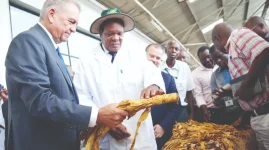Most tobacco farmers in Zimbabwe still need outside money to grow their crops. Patrick Devenish from the Tobacco Industry and Marketing Board told lawmakers last week that local banks simply can't handle the job yet. He explained banks need bigger cash reserves before they can replace foreign companies as major lenders.
Around 95 percent of farmers currently borrow from contract farming deals because they have no choice. This system started back in 2004 when banks refused to help new landowners after Zimbabwe's land reforms. These deals give farmers seeds and fertilizer from tobacco companies based on packages approved by the government board. Farmers must then sell their harvest to these same companies, who take payments directly through an official system.
The country wants 25 percent of tobacco money to come from local sources by 2025. At a recent farming conference, experts talked about ways to make this happen. They found that foreign companies still control tobacco because they have connections to world markets. These big corporations can borrow cash at much lower rates than anyone in Zimbabwe, making it nearly impossible for local banks to compete.
High interest rates inside Zimbabwe block local financing efforts completely. The conference suggested pension funds might help fund tobacco farming through special investment tools. They also discussed farm bonds and asked whether government backing might encourage local banks to join in. A promised $60 million program to help tobacco growers never actually started, disappointing many farmers across the country.
A government loan program called the Tobacco Input Credit Scheme failed because many farmers never paid back what they borrowed. Critics point out that tobacco brings Zimbabwe its second-highest foreign earnings, but much of this money goes right back to the lending countries. People worry that inflated prices for seeds and fertilizer let money slip out of the country illegally. Many local companies exist but really just work for a handful of international corporations.
Around 95 percent of farmers currently borrow from contract farming deals because they have no choice. This system started back in 2004 when banks refused to help new landowners after Zimbabwe's land reforms. These deals give farmers seeds and fertilizer from tobacco companies based on packages approved by the government board. Farmers must then sell their harvest to these same companies, who take payments directly through an official system.
The country wants 25 percent of tobacco money to come from local sources by 2025. At a recent farming conference, experts talked about ways to make this happen. They found that foreign companies still control tobacco because they have connections to world markets. These big corporations can borrow cash at much lower rates than anyone in Zimbabwe, making it nearly impossible for local banks to compete.
High interest rates inside Zimbabwe block local financing efforts completely. The conference suggested pension funds might help fund tobacco farming through special investment tools. They also discussed farm bonds and asked whether government backing might encourage local banks to join in. A promised $60 million program to help tobacco growers never actually started, disappointing many farmers across the country.
A government loan program called the Tobacco Input Credit Scheme failed because many farmers never paid back what they borrowed. Critics point out that tobacco brings Zimbabwe its second-highest foreign earnings, but much of this money goes right back to the lending countries. People worry that inflated prices for seeds and fertilizer let money slip out of the country illegally. Many local companies exist but really just work for a handful of international corporations.












